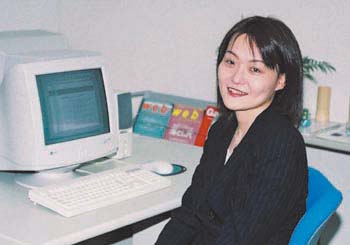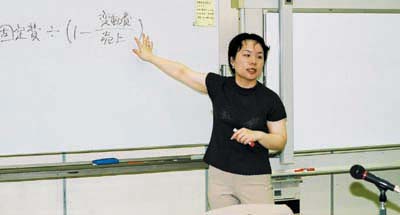Outstanding individuals
Back to Contents of Issue: October 2002
|
|
|
|
by Takehiko Kambayashi |
|
 TAKE NORIKO KAJIKI, WHO smokes with a cigarette holder, likes bright clothes, loves going to discos and runs business meetings with a casual flair. She started out by temping female models, known here as 'companions.' Now she's pushing to make her Nancy software for video a world standard by Christmas 2003. And the way things have been going lately for Kajiki's Office Noa, she just might do it. TAKE NORIKO KAJIKI, WHO smokes with a cigarette holder, likes bright clothes, loves going to discos and runs business meetings with a casual flair. She started out by temping female models, known here as 'companions.' Now she's pushing to make her Nancy software for video a world standard by Christmas 2003. And the way things have been going lately for Kajiki's Office Noa, she just might do it.Or how about Kaori Sasaki, president of community resource eWoman and Unicul International, whose International Conference for Women in Business has been around for seven years. At first, people scoffed at the idea of having a conference for "dropouts of the Japanese economy," as one skeptic put it. But this year, Nissan's Carlos Ghosn -- hardly a dropout by anyone's standards -- was Sasaki's keynote speaker. Women have been pushed to the fringes and are showing an entrepreneurial spirit that is drawing attention and helping them find success. J@pan Inc takes a closer look at women in the workplace in this special report.  Running the Show Running the ShowIn the ancient city of Kyoto, Yumiko Tange leads Awake, a company that runs a PC school, develops software and builds networks. In her simple office, her eyes sparkle when she talks about her year-old business. "I now have a sense of fulfillment since I'm doing what I want to do," she says. Tange felt alienated from society during her five-year stint as a housewife. It stressed her out, she confesses. Although she finally decided to leave the 'boring' housewife life, re-entering Japan's rigid work force is difficult for married women. She first took a part-time job in a computer lab at her alma mater. Soon after that, she began to think about establishing her own company as she learned that her friends, who were also housewives, had difficulty finding jobs despite their willingness to work and their good education. A culture that kept women out of the working mainstream had presented Tange with a business idea. Tange now employs a cadre of housewives who teach women computer skills so that they can find a job. Tange says she often works late into the night and sometimes until dawn to keep her business moving forward. Tange's Awake is one of many new enterprises run by women that are springing up throughout Japan. Even in Hokkaido, the country's northernmost island, which has a reputation for relying on public works and old boys networks, more women, especially those in their late 30s to 40s, have started or tried to start their own business, says Yuko Kanda, a psychotherapist and president of Natural Heart in Sapporo, a company that supports entrepreneurial women. "They are not trying to compete with men; they're trying to create their own businesses, emphasizing their points of view in areas men tend to overlook," Kanda says. As of the end of June, there were 65,915 female presidents in Japan, accounting for 5.57 percent of the presidents of the 1.2 million corporations studied by Teikoku Databank. The number had increased 2.9 percent from the previous year, the survey shows. Since that number does not include the increasing number of small-sized companies in Japan, the actual figure is probably much larger, analysts say. Although the emerging female-owned businesses are small and fledgling for the most part, Kyoko Okutani of Women's World Banking Japan (WWB), which supports entrepreneurs, believes that they "will help Japan's economy bounce back." According to WWB, about 6,000 women between the ages of 18 and 83 have attended its business school in the last 12 years. Of them, almost 1,200 have already started their own enterprise.  Many women decided to start a company by themselves after experiencing the inequality of the workplace firsthand, Okutani says. "I would say the energy from their outrage helps trigger the launching of their businesses."
Many women decided to start a company by themselves after experiencing the inequality of the workplace firsthand, Okutani says. "I would say the energy from their outrage helps trigger the launching of their businesses." In a country where outright women's movements are nonexistent, working women, who are still dubbed 'office flowers' in some places, have trouble climbing the corporate ladder. Many women say promotions are not awarded according to ability and performance; instead, women are very often passed over due to their age and sex. Also, they are usually assigned trivial jobs, such as clerical work and serving tea, and they are often expected to quit when they get married or have a child. In Japan, women are relegated to the second tier of the work force as their role is still seen as 'supportive,' says Keiko Tani of Tokyo Women's Union, a labor group. She says that foreign companies operating in the country are guilty of the same sort of practices. Although some women are put in a responsible position, companies don't give them a raise or promotion accordingly, she says. Japanese companies' awareness of women in the workplace is "extremely behind," Tani charges. "Unless they become more aware of women's potential and treat them equally, it will be impossible to revitalize this country's economy." In 1999, Japan's equal employment opportunity law was amended to mandate punishments for discriminating against women at work. The law was updated in part because the nation's work force will soon begin to shrink, making female employees more important than ever, analysts say. Still, many analysts say, when it comes to sexual equality, Japan is all talk and no action. "I cannot deny that Japan is far behind the US" in terms of appointing talented females to positions of power, says independent economist Takanori Mizuno. "Japanese companies don't treat female talent as seriously as their US counterparts do." In the US, even though there are still few female CEOs, a number of qualified women are serving in managerial positions, says Mizuno, who was a senior economist at Fuji Bank in New York. According to the International Labor Organization (ILO), while women in the US constituted 46 percent of the total work force in 1997-1998, they made up 44 percent of its administrative and managerial positions, jumping from 16 percent in 1970. In Japan, the world's second largest economy, women made up 41 percent of the total work force but they held only 10 percent of administrative and managerial positions in the same period, the ILO says. The number even dropped to 7.8 percent in a recent survey by the Ministry of Health, Labor and Welfare. In other developed countries, the proportion of women in administrative and managerial positions has steadily increased. For instance, in Singapore the number increased to 27 percent in 1996 from 22 percent in 1992, while in Australia it jumped to 27.3 percent in 1998 from 17.2 percent in 1990, according to the ILO. The proportion more than tripled in Canada to 40 percent in 1990 from 13 percent in 1970, its study shows. Even in Pakistan, which is notorious for its treatment of women, the number more than doubled from 4 percent to 9 percent between 1989 and 1997, putting it only 1 percent behind Japan. Mizuno attributes inequality in Japan's workplace to women's passiveness and to the remnants of traditions and ideas from the country's feudal system. At least one Japanese company, however, vows to treat women equally. During the 7th International Conference for Women in Business held in late July, in which he served as a keynote speaker, Carlos Ghosn, president and CEO of Nissan, said Nissan is "shifting from men versus women, seniority versus the young, and Japanese versus non-Japanese to the contribution and performance of a person." But "we maintain differences. We are learning from it," he said. The number of women in managerial positions at Nissan has increased to 28 in 2002 from less than 10 in 1999, the year Ghosn joined Nissan, according to the company. Kiyoko Kinjo, a professor at Tsuda Women's College in Tokyo, also says an increasing number of Japanese companies have become more aware of the strengths women bring to the workplace. "Men's viewpoints don't always meet market demand precisely," she says. "Since the fields of service and welfare are expected to expand more hereafter, I think women's points of view could be put to practical use more often." She adds that businesses that incorporate female viewpoints seem to make "significant progress." Kaoru Yoneyama, a speech instructor in Yamanashi prefecture, central Japan, says she was denied a job and rejected because she is 'old.' Yoneyama, who attended a WWB conference this summer, says women usually try to have a good relationship in their community and gain important experience by raising children. "Women have accumulated invisible assets through the work in their home and community. I believe we can give them back to society," she said. So what's the difference between men and women workers? Women often admit they are less loyal to a company, but perhaps in these times, that's becoming an asset. Also, Okutani of WWB says male owners tend to focus on making profits and care too much about status while their female counterparts are more interested in seeking fulfillment in their life. Tange of Awake in Kyoto agrees, saying, "This is no longer an era when one individual works frantically, makes lots of money and is satisfied." Kyoko Tsujisaka, president of Software Technical Support, a data-processing service company, says she has witnessed people's values change since the start of Japan's economic slump. "When the economy was booming, those in business wanted to make as much profit as possible, even if it was just one more yen, but now they say they want to contribute to society," she says. Tsujisaka is chair of the association of women's entrepreneurs in Osaka city; she started her company 18 years ago with \350,000 in capital and now has annual turnover of \200 million (about $1.7 million). Small businesses are gaining more and more attention these days, Tsujisaka says. "In prosperous days, large corporations used to draw lots of attention," she says. "In an economic slump like this, however, small- to medium-sized enterprises have a very good chance." @ |
|
Note: The function "email this page" is currently not supported for this page.





